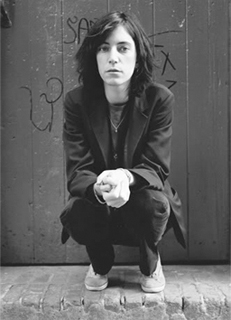Those were our times: Just Kids by Patti Smith
Permanent link All Posts
I have two Patti Smith songs in my iTunes library: one is a live performance of "About a Boy" from the 1997 Tibetan Freedom Concert, and the other is a cover of "Don't Smoke in Bed" from the eternally awesomely named Ain't Nuthin' But a She Thing. For most of my life, these and her status as "the Godmother of Punk" were all I knew about her. I never expected I would have feelings about her and her work, but as it turns out, that's only because I hadn't met her yet.
My favorite podcast for puttering around my apartment is NPR's All Songs Considered. Last month Smith was a guest DJ, to promote her new album, and before hitting "play" in iTunes, I had no idea what to expect. What does it mean to be the 65-year-old Godmother of Punk? I admit I only half-listened while I did my dishes, until her first song stopped me in my tracks. It was an anthem for the people of Japan in the aftermath of the tsunami, and the opening invocation gave me chills. After that, I listened, and became both interested in and impressed by this woman who spoke softly and beautifully about Amy Winehouse, growing up in New Jersey and her love of poetry.
Luckily for my newfound curiosity, Patti Smith has written an autobiography of sorts, Just Kids. I say "of sorts" because it's more properly the biography of a friendship, an amazing bond between her and the photographer Robert Mapplethorpe. I had heard of it when it came out a few years ago--it had won widespread acclaim and a number of awards. In an effort to curb my terrible book-buying habit, I hit up my library for a copy, but Patti has defeated me: I think I need to own this book.
If you only read Just Kids for its parade of fascinating experiences, discovering late '60s and early '70s New York from its underbelly to its heights, you'll get a great deal out of this book. If you only read it for her prose, which is marvelous, you'll absolutely enjoy yourself. But you can also read it for the contact high of her incredible love for Robert. She lays out their secret language, their struggles, their explorations, their growth as people and as friends, and it's a gift to be allowed inside it.
Just Kids is a period piece, and it's tempting to wish yourself into her shoes, to imagine hanging out with Janis Joplin or Jimi Hendrix. Smith does not cut corners about the unglamorous parts of artistic poverty. As much as she writes about beauty and excitement and creation, she doesn't spare us the lice or the hunger or the deaths of friends. We're not spared heartache even in the happy times: throughout the book is the specter of Mapplethorpe's death from AIDS, engrained in the text from the first sentence.
This book is a biography of a friendship, though, and the most interesting thing to me about Just Kids as a period piece is how the mechanics of friendship have and haven't changed. Patti and Robert are always making each other little gifts; they express themselves to each other with a lot of tactile effort and physical creations. They take long train rides or spend hours at diners together; they write letters and make collages or poppets or jewelry. Today, for those ordinary adorations, we send links or texts or posts on a Facebook wall. I found Patti Smith because of a podcast, on iTunes, on an iPod.
For me, this raises a lot of questions about authenticity, and why, when we have all this technology and the amazing things it affords us, we're so taken with nostalgia and "retro" and vintage experiences. I saw the music video for Beirut's "Postcards from Italy" for the first time while reading Just Kids, and it's assembled entirely of '60s-style home video footage, some staged and some, perhaps, "real." Someone once said that there must be a German word for the longing you feel for a memory you never made, and I get that feeling from this video. Someone is documenting this vacation, but everyone else is entirely present. Which, today, almost makes it a fantasy world.
I have wonderful, meaningful, important bonds with people I haven't met in person, and the point of Just Kids is not to valorize Robert and Patti at the expense of how we live in the world today. We're authentic, however we choose to reach out to people. It's wonderful to be able to see inside someone else's authenticity, though. Just Kids is fearless in that respect, because that necessitates vulnerability too. If authenticity is building yourself up, being your own maker and choosing how and what you love, then Patti Smith has it-and that is, in the end, pretty punk rock.



.jpg)



